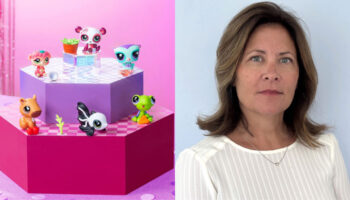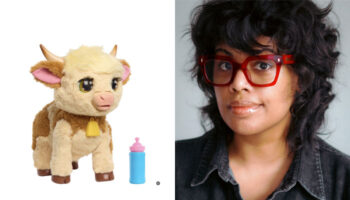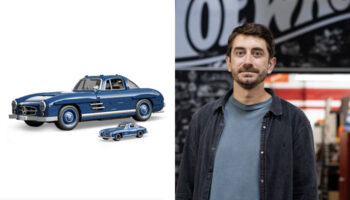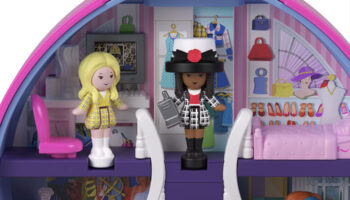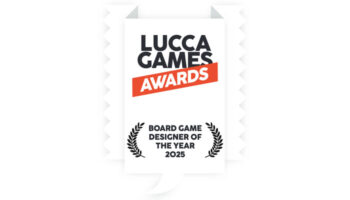“We need nuggets of ideas – and you have to mine for them!”: ThinkFun’s Josh West discusses his approach to inventor relations

Josh, it’s great to catch up! To kick us off, what was your route into working in toys and games?
I was always into collectibles, but I worked for many years part time in a little toy shop in my hometown. The shop is still around and I go in from time to time when I’m back home; a number of people who worked there have been mentors to me. I then went off to university and at the time, I’d wanted to do animation. When you start down that path, I got to the point when I found it a bit samey, and it wasn’t for me. That’s when I discovered industrial design – it was a new programme at the university.
I was advised by a professor that it would be easier for me to be employed afterwards if I picked a speciality [in Industrial Design]. I said: “Can I do toys?” because I still worked part time at the toy shop and that’s what I found interesting. That’s what set me on this path.
Amazing – and what is the name of that toy shop?
It’s currently called Franklin’s Toys. At the time it was called Be-Beep. If you’re ever in Annapolis or Severna Park, Maryland – stop on by!
I will! And did that retail experience shape your approach to inventor relations?
Absolutely. I remember my first New York Toy Fair, the company wanted me to demo toys and take customer orders, and I was almost a bit cocky! I was like ‘I’ve got this – I’ve been selling toys forever!’ I sat down, jumped right into explaining how great this toy was and this retailer turned round and said: “Okay, great, but what terms can you give me?” I had no idea what they meant! That was my first eye-opener that ‘industry-standard’ was a little different! That said, my time spent explaining to young mums and dads why they should buy a particular toy has informed how I now look at toy and game concepts.
Lovely. Now, we interviewed the wonderful Dan Klitsner a while back about Freefall and he raved about you! Folks can find that chat here.
He was very kind!
Well, he’s not alone in being a fan! How would you describe your approach to working with inventors?
It’s about cultivating the relationships with inventors. One of the points Dan made in your interview was that we’d tried at that [Freefall concept] for a while. We met with Dan for a long time before signing.

People starting out in invention sometimes think: ‘Great, I have quite a few ideas so something’s going to happen.’ That’s not always the case; it usually takes some time. The first time I meet an inventor, sometimes there’s nothing shown to us that will work, but I can tell they have a creative spark, so we should keep talking.
At ThinkFun, our product is very niche. It’s learning while being fun, so having these regular conversations and building up a rapport with inventors is useful. It helps them learn what I’m talking about and in turn, I learn more and more about their expertise. We need nuggets of ideas, but you have to mine for them. Cultivating relationships with inventors is key to that.
Speaking of nuggets, it sounds like you don’t mind meeting inventors halfway with ideas. You like to be active in shaping concepts and mapping out where they could go.
I try to be like that! I don’t always have the time, but that’s where my colleague, Nick Tourville is coming through in taking a stronger role in inventor relations. We also have a great design team, so bringing concepts back, discussing them with a group of people and feeding that back to the inventor is the ideal scenario.
You mentioned earlier that ThinkFun is a little niche, but am I right in thinking you don’t just seek out inventors that specialise in puzzles? There are other ways to unearth ideas that are right for ThinkFun?
That’s right. We’re looking for the nugget of an idea. There are some wonderful inventors out there that will throw down a puzzle and I’ll know it’s exactly the kind of thing we would do – and that’s great! But usually we’re just looking for that nugget. We can take a great idea and get it to where we – as ThinkFun – need it to be. We can do puzzles, so what we need from inventors is that nugget of a good idea, the creative spark or a clever gizmo. It’s wonderful if the idea has been fully fleshed out, but it’s not a dealbreaker and we don’t expect it.
Are there any examples that come to mind of an inventor pitching you a ‘nugget’ that your team has then helped carve into a ThinkFun item?
Yes, one that springs to mind is a game that we’ve just released called Goats’ Day Out. Goats’ Day Out started with a totally different theme. The inventors – Bluematter Games – had built this great mechanic for drafting puzzle pieces. You play it like a regular card drafting game, but with puzzle pieces. The original theme was clown cars, and clowns can be a little divisive, so as we playtested we tweaked that, the scoring and the rules – but the core mechanic was solid and remained throughout.
What’s also interesting with that one is that it’s more of a game than what we usually do. We’re mostly known for our single player logic puzzles that are a little bit game and a little bit toy. When we see a game that we like and that fits our brand, we go for it.

It looks fun! I wanted to also pick your brain on pitching. What are some of your do’s and don’ts?
I think it’s about how quickly can you get to that ‘nugget’ that we’ve been talking about. I love it when professional inventors start with “Let me show you this reveal”. It might be a few steps into the game, but they kick off with the ‘TA-DAH!’. Sometimes that magic moment means we’ll bring it in and sometimes it still won’t be for us, but getting to that fast means we can move onto the next idea either way.
On the flip side, if it takes a long time to explain, that’s not ideal. If you look at it from the other end, when the game is on shelves, people are going to glance at the product for two seconds and move on, so you need to explain why it’s cool quickly.
Great advice. Now, what’s the value in meeting with new inventors for ThinkFun?
Very high! We need to increase the pool because you never know! Each person brings their own diverse experience to their ideas. We were at an event for unpublished inventors recently and a new inventor showed us something that was great. We couldn’t believe it was their first idea!
We need a variety of diverse backgrounds and fresh perspectives that we can bring into the fold, without losing sight of our valued partners in the professional pool.
Absolutely. Now, a tough question! What would you say is ThinkFun’s most underrated item? We can give it the spotlight here!
Where do I begin! Jeeze… The list is as long as my arm!
Ha!
One is Invasions of the Cow Snatchers. It had a really neat mechanic, and if you read reviews, people that got it, really got it.

This is the magnetic game where you’ve moving a UFO across the grid, avoiding obstacles and beaming up cows?
Exactly. For whatever reason it didn’t take off. We had another one called Houdini invented by Bluematter Games that was incredible but didn’t catch on.

Both look fantastic.
Well there’s another one that’s near and dear to my heart called Mystic Market – it’s done okay but I thought it would go further. If you read the BGG reviews, the people that have found it are very passionate about it. All of these have brilliant designs and we’re really proud of them, but for whatever reasons didn’t quite catch on.

You’ve provided me with a neat shopping list there – they all look great! Especially that potions track in Mystic Market – what a nice component!
Thank you – and Mystic Market was another one that went through an evolution internally. It was invented by Ken Gruhl and when he showed it to us, it was ‘Milk Market’. We loved the mechanic and worked with Ken to build in more of an in-depth economic system. And that value tracker you mentioned; my colleague at the time – Kathy Beyerle – thought that little element was so neat and spent a lot of time on that design! It was the stroke of brilliance that we look for from inventors.

Lovely. Now, earlier this year we interviewed Rachele Harmuth, Head of ThinkFun, about how inventors can engage with the MESH initiative, which stands for Mental Emotional Social Health. Has it changed how you approach product development and collaborate with inventors?
It changes what we recognise. It’s something ThinkFun and other companies were doing without realising how impactful it was. It gives us a chance to say: “This is a brilliant toy – and it has strong ties to this particular element with MESH”. Those benefits are important to recognise. And it may well have always had that element to it, but we’re only recognising and speaking it to now through the MESH framework.
I imagine it’s also useful for inventors to recognise how their concepts align with MESH – and then convey that to you in pitches too.
It would be an excellent idea for inventors to do that. Absolutely.

Josh, this has been great. I have one final question – what fuels your creativity? What helps you have ideas?
It’s a two-step thing. The first one is that I need to pull away. That might mean closing my laptop and sitting in a chair… Just some time to think and maybe doodle a little bit. I need to devote time to just thinking.
The second step is needing other people. I’ll have an idea on my own and then I’ll bring it to the team and sometimes they’ll say: “That’s a great idea!” Other times they’ll say: “We’re waiting for you to get to the good part because it can’t be what you just said…” You can’t always create in a vacuum!
A huge thanks again for taking time out for this Josh, I’ve had fun!
–
To stay in the loop with the latest news, interviews and features from the world of toy and game design, sign up to our weekly newsletter here


